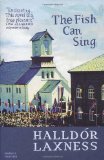 Halldór Laxness won the Nobel Prize for Literature in 1955
Halldór Laxness won the Nobel Prize for Literature in 1955
Translated from the Icelandic by Magnus Magnusson
Five words from the blurb: Reykjavik, childhood, singer, fisherman, ethos
A few years ago I read Independent People and loved it. The Fish Can Sing isn’t quite in the same league, but it is still an impressive book and I’d recommend it to anyone who has enjoyed Independent People.
The Fish Can Sing is set at the start of the twentieth century and follows Álfgrímur, a boy who has been abandoned by his mother and raised by an elderly couple who live on the outskirts of Reykjavik. Álfgrímur is convinced that he will grow up to be a lumpfish fisherman like his adopted grandfather, but his cousin becomes a world famous singer and introduces him to the higher members of society, changing his outlook on life forever.
The Fish Can Sing has many impressive sections and I found the ending particularly striking, but the lives of Reykjavik’s elite didn’t interest me anywhere near as much as the isolated farmers of Independent People. This lead to a divided book where I loved the sections in which their rural life was explained, but the central sections in the city often left me cold.
Although I was bored at several points this was all made up for by Álfgrímur’s grandfather, Björn, who was one of the most inspiring characters I’ve ever read about. He believes that it is immoral to earn more money than you need and he dedicates his life to helping others. His house is open to anyone who needs a roof over their head and he often looks after the dying. His attitude was inspiring and the world would be a much better place if everyone shared his moral beliefs.
This book also contained several political sections and whilst most were of little interest to me, some were entertaining and I especially loved the debates around whether barber shops should be allowed:
He said that those who wished to be in fashion in these matters ought to be content to shave once a month, and to do it, what’s more, quietly and unobtrusively, each in his own home, without calling in perfect strangers from town – for shaving was a private matter….
and the counter argument…
No sane or healthy man had ever grown a beard. There was no conceivable work at which a beard did not get in the way. The only people who grew beards were men with tender skins, and the only cure for that ailment was to seize them by the beard and drag them back and forwards through the whole town.
The quotes above demonstrate the humour of this book. It is far lighter in tone than Independent People and shouldn’t shock or depress people in the same way.
This book is like nothing I’ve read before. It challenges the reader with new perspectives on life, gives an insight into the lives of Icelanders a century ago, and has a very clever ending. If you are willing to work through the slow sections you will be rewarded for your effort.

.
The thoughts of other bloggers:
At times I felt physically stunned by cunning revelations in the structure of the threads running through the book. Dangerous Ideas from the Wood
At any rate, this is a most peculiar novel, and while it kept me entertained and chuckling, as it came to its strangely airless end, I was left with the most peculiar feeling that the joke had been on me — and that I hadn’t gotten it at all. Kate of Mind
If you want to walk the trodden path when reading a book, chose another one. Beauty is a Sleeping Cat
